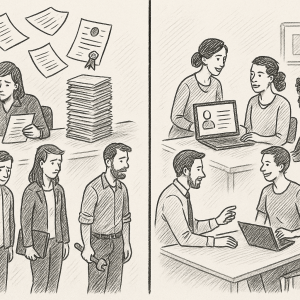For decades, the recruitment checklist often started with “Degree required.” But think about it: does a specific diploma always guarantee someone can actually do the job effectively today, or adapt to the needs of tomorrow? Increasingly, forward-thinking companies are realizing the answer is often “not necessarily.” They’re shifting their focus from qualifications on paper to quantifiable skills.
The way we find and evaluate talent is changing. Relying heavily on traditional degree requirements can limit your talent pool and overlook highly capable individuals. Enter skills-based hiring (SBH) – a practical approach focused on identifying, assessing, and hiring candidates based on their demonstrable abilities and competencies relevant to the role, regardless of how they acquired them.
What does “skills-based hiring” actually mean?
Skills-based hiring is fundamentally about focusing on what a candidate can do, rather than solely on their academic background or previous job titles. It involves:
- Identifying: clearly defining the specific skills (both technical/hard skills and soft/human skills like communication, problem-solving, collaboration) required for success in a particular role.
- Assessing: using methods that allow candidates to demonstrate those skills – think practical exercises, work sample reviews, behavioural interviews focused on past actions, technical assessments, or simulations.
- Valuing potential: recognizing that valuable skills can be gained through various paths, including online courses, certifications, bootcamps, apprenticeships, volunteer work, or real-world project experience – not just traditional university degrees.
It’s about hiring for capability and potential, widening the net to find the best person for the job based on merit and ability.
Why smart companies are shifting to a skills-first approach
Adopting a skills-based approach isn’t just a trend; it offers significant advantages:
- Wider talent pools: you tap into a much larger group of potential candidates, including talented individuals often referred to as STARs (Skilled Through Alternative Routes), who may lack traditional degrees but possess critical skills.
- Improved diversity & inclusion: over-reliance on specific degrees can inadvertently create barriers for underrepresented groups. Focusing on skills promotes equity and leads to more diverse teams.
- Better job fit & performance: hiring based on the actual skills needed for the role logically leads to employees who perform better and ramp up faster. Example: Hiring a coder based on a coding challenge often predicts job success better than relying solely on a Computer Science degree.
- Increased retention: employees hired for skills they possess and enjoy using are often more engaged and satisfied, leading to lower turnover.
- Future-proofing your workforce: in a rapidly changing world, focusing on adaptable skills (like critical thinking, learning agility, communication) helps build a more resilient and future-ready team.
Putting skills first: practical steps for your hiring process
Shifting towards SBH involves several key actions:
- Define essential skills: for each role, collaborate with hiring managers to identify the core technical and soft skills truly necessary for success. Separate “must-haves” from “nice-to-haves.”
- Revamp job descriptions: rewrite JDs to clearly emphasize required skills and experiences over degrees.
- Use skills assessments: incorporate objective assessment methods into your process (e.g., short practical tasks, portfolio reviews, technical and language tests, structured interviews with behavioural questions like “Tell me about a time you used skill X to solve problem Y”).
- Train your team: ensure recruiters and hiring managers understand SBH principles and are trained to evaluate skills consistently and objectively, reducing bias.
- Look beyond the resume: encourage candidates to showcase skills through portfolios, GitHub repositories, project examples, or relevant certifications.
Crafting skills-based job descriptions: practical tips
- Lead with skills: start with the key responsibilities and the specific skills needed to perform them.
- Use action verbs: describe what the person will do using clear, action-oriented language (e.g., “Analyse data,” “Develop strategies,” “Collaborate with teams,” “Communicate findings”).
- Differentiate requirements: clearly label skills/experiences as “Required” or “Preferred/Bonus.” Be realistic about what’s truly essential.
- Justify degree needs: if a degree is genuinely required (e.g., for licensing), state it. Otherwise, consider phrases like “Bachelor’s degree or equivalent practical experience,” or remove the requirement entirely if skills and experience suffice.
- Focus on impact: briefly describe the challenges the role addresses and the impact the person can make. This attracts problem-solvers.
- Use inclusive language: avoid unnecessary jargon, acronyms, or culturally specific terms that might deter qualified candidates.
- Invite skill demonstration: if applicable, ask candidates to share portfolios, links to projects, or prepare for a skills assessment.
- Example shift:
- Old: “Requires Bachelor’s in Communications and 5+ years experience.”
- New: “Required: Proven ability to develop and execute internal communication plans for diverse audiences. Demonstrated experience managing multiple communication channels (email, intranet, presentations). Strong writing and editing skills essential. Preferred: Experience in change management communications. Equivalent practical experience will be considered in lieu of a degree.”
Communication as a skill: verifying language proficiency
In nearly every role, communication is a critical skill – whether it’s collaborating with colleagues, interacting with clients, or understanding instructions. Skills-based hiring demands that we assess all essential skills reliably. How do you objectively verify if a candidate possesses the necessary language proficiency to communicate effectively in your work environment? Relying solely on interview conversations can be subjective and inconsistent.
Just as you might use a coding test for a developer, you need a reliable way to assess language skills when they are vital for the job. This is especially true when hiring for roles requiring interaction in a specific language or recruiting from global talent pools.
Your partner in verifying communication skills: Focus Audit Tool
This is where Focus Audit Tool provides a crucial solution for skills-based hiring practices. Our platform enables you to objectively and efficiently verify the language skills – a key component of communication competency – of your candidates.
Here’s how Focus Audit Tool supports your SBH strategy:
- Objective assessment: provides standardized, reliable online audits across 30+ languages, removing guesswork and subjective bias from language evaluation.
- Focus on practical ability: assesses skills relevant to a business context (speaking, writing, comprehension, grammar, lexis), ensuring candidates can actually use the language effectively at work.
- Efficiency for HR: delivers quick, clear reports, saving recruiters and hiring managers time compared to lengthy or inconsistent interview-based assessments.
- Supports diversity & inclusion: offers a fair and consistent way to evaluate language skills for candidates from all backgrounds, ensuring you assess ability, not origin.
- Aligns with SBH principles: provides concrete data on a critical skill, allowing you to make informed hiring decisions based on verified capability.
By incorporating Focus Audit Tool, you ensure that when communication in a specific language is a required skill, you have objective proof the candidate possesses it, strengthening your skills-based hiring process.
Unlock hidden talent pools: embrace skills-based hiring
Skills-based hiring represents a powerful shift towards building more capable, diverse, and adaptable teams. By focusing on what candidates can do rather than just their academic history, you unlock vast pools of talent and hire individuals truly equipped for success. Start by critically evaluating your job descriptions, identifying the core skills needed for each role, and incorporating objective assessment methods – including reliable verification for essential communication skills. Embracing a skills-first mindset isn’t just about better hiring; it’s about investing in potential and building a workforce ready for the future.






